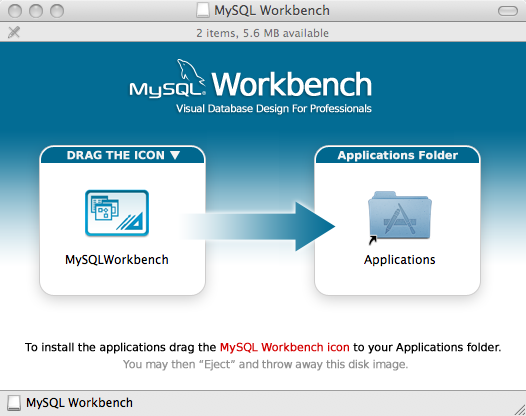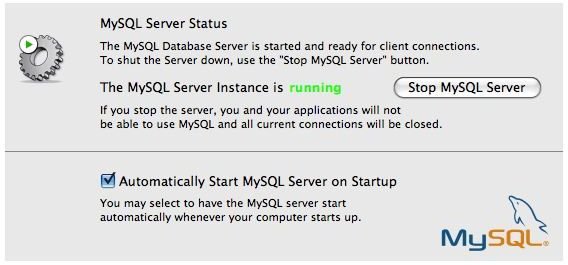Documentation
- Getting Started
- Reference
- Bundles
- Contribute
For Beginners
Mac OS X doesn't ship with its own copy of MySQL, nor does Sequel Pro. You will have to install a copy on your local machine, or connect to the MySQL server on a machine somewhere on the Internet.
File: Installing MySQL on MacOS X for Specify Revised: 6 July 2015 Page 4 Open the installed file once the download is complete, the window below will appear. Open the downloaded package such as “mysql‐5.6.13‐osx10.7x8664.pkg” as an example package name shown below. Mar 06, 2021 To download MySQL in Mac, follow the following steps. Step 1: The first thing you need to do is open your browser and then type ‘mysql.com.’ This will open the MySQL page. Step 2: After opening the MySQL page, click on the ‘Download’ option located on the navbar. After opening the download page, scroll down and select ‘MySQL Community. Answer (1 of 19): I use MySQL GUI clients mostly for SQL programming, and I often keep SQL in files. My current favorites are: DBVisualizer Not. Download the MySQL DMG for Mac OS X. Install Preference Pane. Open System Preferences → MySQL. Ensure the MySQL Server is running. Optionally, you can enable MySQL to start automatically. The README also suggests creating aliases for mysql and mysqladmin.
Most webservers and website packages will include a MySQL installation as part of the services they provide, and usually provide external connection details to allow you to connect to them in an external program like Sequel Pro. (See Web Hosting Providers for a list of hosting options).
There are several different ways to install MySQL on Mac OS X. We have provided links to the most common installation methods for Mac OS X.
Using the official .pkg installer
This is the fastest method for installing MySQL on your Mac, but only available for Intel processors. MySQL.com offers a standard MacOS installer package that installs the MySQL Server and several command line utilities. The download also includes a system preference pane for starting/stopping the server. You can optionally install a startup item that starts the MySQL server when your computer starts. The download weighs about 70MB.
- MySQL 5.0 for Mac OS X — for MacOS 10.4-10.5, Intel only
- MySQL 5.1 for Mac OS X — for MacOS 10.4-10.6, Intel only, recommended Version
- MySQL 5.5 for Mac OS X — for MacOS 10.4-10.6, Intel only
MAMP / XAMPP on Mac OS X
Download Mysql Mac Os X 10.11
MAMP and XAMPP are complete web development packages. They are designed to give developers an easy way to serve up PHP pages using Apache and MySQL right on their Mac. The two packages differ in the selection of utilities they include, but both of them include their own version of Apache, MySQL, and PHP.
These packages are installed by copying the MAMP/XAMPP folder to your applications folder. There are no hidden files and both packages are trivial to uninstall — just drag the MAMP/XAMPP folder to the trash.

MAMP includes a GUI utility for starting and stopping the servers. The utility also allows basic configuration of the servers, including the port MySQL runs on (default is 8889). There is a commercial utility (named MAMP PRO) available for more advanced options. MAMP includes PHP 4 and 5.2, and MySQL 5.1. The download is about 160MB.
- Download MAMP/MAMP Pro — for MacOS 10.4-10.6, Universal binary
XAMPP provides only a utility for starting/stopping the servers. Configuration is performed using command line utilities. XAMPP includes PHP 5.3, MySQL 5.1, and several extras like Perl and an FTP Server. XAMPP weighs in at about 90MB.
- Download XAMPP — for MacOS 10.4-10.6, Universal binary
If you use one of these packages, see Connecting to MAMP or XAMPP for further instructions.
Install from Source
Installing a copy of MySQL from source is recommended for advanced users only. There are many advantages to compiling your own copy of MySQL — including speed improvements and system specific customisations (eg. for machines with little RAM). Installation from source also gives you access to cutting edge features and bugfixes before a .pkg installer is available.
You must have the Xcode Developer Tools installed. Compiling takes a very long time compared to installing binaries, but you'll only have to download about 20MB of source code.

- Installing from source — MySQL
- Tutorial for Tiger and Leopard — Hive Logic
- Tutorial for Snow Leopard — Hive Logic
Using MacPorts
If you want to install from source, but spare yourself the hassle of configuring the install, you can use Macports to automatically compile and install MySQL. This method works only if you have MacPorts and the XCode Developer Tools installed. The MySQL download is aproximately 20MB plus dependencies.
With MacPorts you can install the MySQL Server by typing the following command in Terminal:
Afterwards, you must run:
Start MySQL:
Mysql Workbench Download For Mac
Stop MySQL:
Mac OS X Server comes with MySQL pre-installed. For instructions on how to enable MySQL, see Setup on Mac OS X Server.
Slicehost Articles
Mysql Database Software For Pc Free Download
Install MySQL on Ubuntu Hardy
Install MySQL on CentOS
Install MySQL on Debian Lenny
Install MySQL on Debian Etch